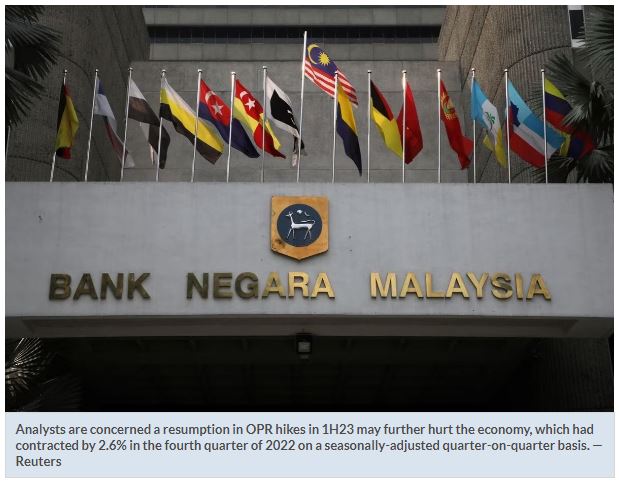Malaysia: Economists call for longer pause on OPR hike by Bank Negara
PETALING JAYA: Bank Negara may take a longer pause before raising its benchmark interest rate again this year.
This could bring some cheer to the market and households, whose pockets have been hit by the rise in borrowing costs.
Against the backdrop of a slowing economy, more analysts are looking at the possibility of overnight policy rate (OPR) hikes being pushed into the second half of 2023 (2H23).
This marks a significant diversion from earlier expectations, whereby pundits were largely anticipating two rounds of rate hikes in the first-half.
Bank Negara, which surprised the market in January by hitting the pause button on OPR hike, is expected to continue taking a wait-and-see approach.
Analysts are concerned a resumption in OPR hikes in 1H23 may further wound the economy, which had contracted by 2.6% in the fourth quarter of 2022 on a seasonally-adjusted quarter-on-quarter basis.
Aside from the negative growth, economist Paolo Casadio said a stagnation in industrial activity and a sharp contraction of export would necessitate a pause in OPR adjustments.
“The evolution suggests the need to monitor further the situation before deciding another move in the interest rates.
“The expectations of the market should incorporate this new scenario and expect a possible intervention by Bank Negara in the second half of the year,” he told StarBiz.
The OPR stands at 2.75%, still slightly below pre-pandemic level of 3%.
In 2022, Bank Negara had raised the OPR by a cumulative 100 basis points (bps) from the record-low level of 1.75%.
Casadio, an economics professor at the HELP University, had been calling for the OPR to be retained since last November on the belief the OPR was already back to the “neutral” level at 2.75%.
In addition, he said a pause is required, considering the expected change in the Malaysian business cycle due to the negative international scenario.
Casadio added there would be a “negligible” impact on market earnings if Bank Negara retains the OPR at 2.75% over the next few months.
“However, the new path of the OPR contains an important signal to the market and the government about the additional prudence to consider in taking new business decisions,” he said.
The price trajectory of banking stocks, that account for some 40% of the benchmark FBM KLCI weightings, appear to have levelled off following the central bank’s decision to hold the OPR steady, while the weaker economic growth prospects and rising cost pressures have put a negative bias to investor-sentiment. Economist Manokaran Mottain also called for a longer pause in rate hike, although he expects the OPR to reach 3.25% by end-December.
“A pause is needed because people are still complaining about cost of living.
“In addition, appropriate actions to remedy cost of living are not coming as fast as we expected.
“So, under such a circumstance, a continued OPR hike would only add burden on the rakyat,” said the former chief economist of Alliance Bank.
Eventually, Manokaran said Bank Negara has no choice but to raise the OPR – potentially higher than pre-pandemic level – as the US Federal Reserve had aggressively tightened its monetary policy last year.
“There is a need to maintain a certain spread between OPR and the US federal funds rate, without a too-big gap,” he added.
CGS-CIMB Research analyst Nazmi Idrus also expects Bank Negara to adopt a wait-and- see approach with the increasingly weaker domestic environment.
In a note issued yesterday, Nazmi said the central bank’s pause in the OPR during its Jan 23 Monetary Policy Committee meeting portrayed a cautious outlook.
“We expect two rate hikes of 25 bps in 2H23, bringing the OPR to 3.25% at end-December,” he said.
Weak domestic demand
Looking ahead, Nazmi cautioned that the country’s weak domestic demand poses risk to growth, forecasting the gross domestic product to grow by 4.4% in 2023.
In 2022, the economy expanded by 8.7%, the strongest annual growth since 2000.
However, domestic private consumption appeared weak in the fourth quarter of 2022, even as the labour market saw continued improvements.
Moving forward, Nazmi opined that consumers may have started “downtrading” amid rising costs.
“This may be reflected in further softening in private consumption.
“We expect the revised Budget 2023 to provide guidance on the government’s strategy for tackling the rising cost of living,” according to Nazmi.
Budget 2023 is scheduled to be tabled in Parliament on Feb 24.
Manokaran expects Budget 2023 to contain measures that will help alleviate the high cost of living.
“We need more measures that can help the rakyat over a longer run, rather than just short-term cash handouts,” he said.
Manokaran suggested “fair price shops” across the country that sells basic necessities at subsidised prices.
The idea is quite similar to the “ration shops” operated in India.
“The fair price shops can offer cheaper alternatives to low-income Malaysians, so that they do not have to reduce their dietary consumption just to tighten their belts,” he said.Additional income
Manokaran also called for the reintroduction of the “buku hijau” (green book) concept, but in a revamped manner, to help Malaysians gain additional income.
In 1970s, the government had implemented the plan to encourage Malaysians to take up short-term gardening or farming.
“When I grew up in the estate back then, my family and our neighbours benefited from the green book plan as we managed to grow vegetables and rear cattle on the land provided by the government.
“A similar plan can be re-introduced now. The government can provide unused land to the rakyat on a lease basis where vegetables can be grown. The land can be anywhere – below telecommunication towers or electricity transmission lines,” said Manokaran.
Source: https://www.thestar.com.my/business/business-news/2023/02/14/economists-call-for-longer-pause-on-opr-hike-by-bank-negara


 Thailand
Thailand




